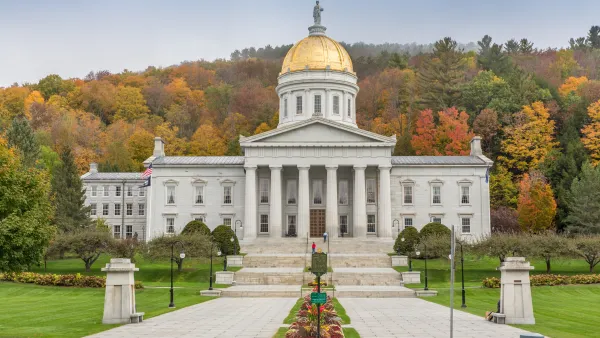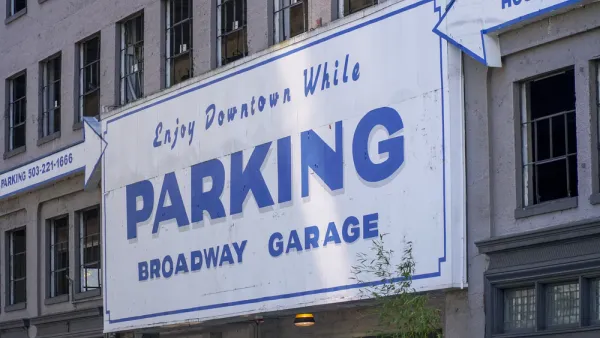Oregon, the first state to end single-family zoning statewide, is on the cusp of another historic planning reform as the Land Conservation and Development Commission nears approval for new “Climate-Friendly and Equitable Communities” rules.

[Updated on July 9, 2022 to correct the number of jurisdictions affected by the statewide reform from 61 to 52.]
Oregon’s Land Conservation and Development Commission is in the process of approving a major reform package of land use regulations that would give 52 cities in the state options for rolling back parking regulations.
The commission granted preliminary approval to the Climate-Friendly and Equitable Communities rules in May, with a hearing to fully approve the rules scheduled for July.
News coverage of the commission’s decision includes a guest column by James Roberts for the Bulletin, which focuses on the impact of the new rules specifically for the city of Bend. Roberts, a resident of the city of Bend, has clearly read The High Cost of Free Parking, describing parking regulations at arbitrarily established. “Today in Bend, our zoning rules require nearly all new homes to build at least one or two off-street parking spaces, even though half of households who rent only own one or zero cars. Those extra spots that go unused aren’t just a waste of space, they also add building costs to already high rents,” writes Roberts.
Coverage of the decision also includes a series of articles published by the Sightline Institute. A May 21 Sightline article by Michael Andersen reports on how close the commission is to approving the sweeping parking reforms, with details about the politics of the parking issue at the state level.
An earlier Sightline article by Andersen along with Catie Gould details the reach and intent of the Climate-Friendly and Equitable Communities rules.
“Over the next three years, it would give the 52 jurisdictions in the state’s eight largest metro areas—the urbanized areas in and around Albany, Bend, Corvallis, Eugene, Grants Pass, Medford, Portland, and Salem, home to about two-thirds of the state’s population—various options for rolling back or eliminating their decades-old parking mandates, especially in designated ‘climate-friendly areas’ (CFAs). The CFAs, whose borders would be drawn by most of the jurisdictions over the next few years, would also allow mixed-use buildings of up to four stories and see higher standards for walking, biking, and transit investments,” according to the article.
FULL STORY: OREGON NEARS GREEN LIGHT FOR BIG PARKING REFORM

Analysis: Cybertruck Fatality Rate Far Exceeds That of Ford Pinto
The Tesla Cybertruck was recalled seven times last year.

National Parks Layoffs Will Cause Communities to Lose Billions
Thousands of essential park workers were laid off this week, just before the busy spring break season.

Retro-silient?: America’s First “Eco-burb,” The Woodlands Turns 50
A master-planned community north of Houston offers lessons on green infrastructure and resilient design, but falls short of its founder’s lofty affordability and walkability goals.

Test News Post 1
This is a summary

Analysis: Cybertruck Fatality Rate Far Exceeds That of Ford Pinto
The Tesla Cybertruck was recalled seven times last year.

Test News Headline 46
Test for the image on the front page.
Urban Design for Planners 1: Software Tools
This six-course series explores essential urban design concepts using open source software and equips planners with the tools they need to participate fully in the urban design process.
Planning for Universal Design
Learn the tools for implementing Universal Design in planning regulations.
EMC Planning Group, Inc.
Planetizen
Planetizen
Mpact (formerly Rail~Volution)
Great Falls Development Authority, Inc.
HUDs Office of Policy Development and Research
NYU Wagner Graduate School of Public Service




























